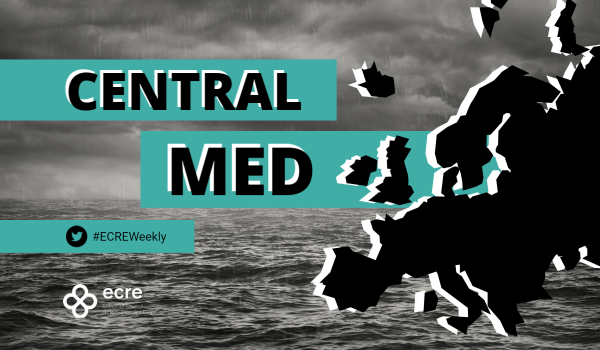The government in Cyprus is pushing for a broadening of the Instrumentalization Regulation to include the Green Line separating the Island. The death toll on the Mediterranean continues to climb while civilian search and rescuers face non-response and delays of disembarkation of hundreds of survivors from member states.
According to the government of the Republic of Cyprus, 13,000 people applied for asylum in the country between January 1 and mid-August, 2022. Asylum seekers now make up over 5% of the population, leading Cypriot president Nicos Anastasiades to state: “The growing percentage of migrants compared to the local population poses serious concerns”. As the EU pushes forward attempts to reach approval on the European Pact on Migration and Asylum, the Cypriot government is reportedly pushing for the inclusion of a reference to the Green Line separating the island. “Although the Green Line is not an external border, it follows that the situation in which a third country or a non-state actor encourages or facilitates the movement of third-country nationals to cross the line should be considered instrumentalization,” it was reportedly stated in a draft, which still has to be approved. In a joint statement, ECRE and NGOs across Europe recently pointed out that “Agreeing on the Instrumentalisation Regulation will be the Final Blow to a COMMON European Asylum System (CEAS) in Europe” and defined the regulation as disproportionate, counterproductive, unnecessary, misguided and unfair.
Driven by the economic crisis, increasing numbers of people are attempting to reach Europe from Tunisia across the dangerous Mediterranean route. More than 21,000 Tunisians have attempted to cross in 2022 so far. At least 8,000 of them were turned back or died at sea. The number of confirmed dead from the shipwreck off Tunisia reported last week has risen to 11 and 12 others are still missing. Six Syrian nationals including two infants and a child were found dead on a boat that arrived in the Sicilian port of Pozzallo. “They died of thirst, hunger and severe burns. This is unacceptable,” said UN Refugee Agency (UNHCR) representative to Italy, Chiara Cardoletti, adding: “Strengthening rescue at sea is the only way to prevent these tragedies”. According to the agency, more than 1,200 people have died or gone missing in 2022 attempting to cross the Mediterranean and reach Europe. Another deadly tragedy occurred in Turkish waters where a boat carrying a large group of people departing from Lebanon attempting to reach Italy sunk on 12 September. According to the Turkish coastguard six people including children drowned, five people remain missing and 73 were rescued.
Civilian search and rescue operators have saved hundreds of lives in the Mediterranean over the recent period. By 12 September, the Sea-Watch 3 operated by Sea-Watch International, Sea-Eye 4 operated by Sea-Eye and Humanity 1 operated by SOS Humanity had rescued a combined 765 people. On 14 September Humanity 1 rescued another 207 people and one day later Open Arms reported the rescue of 19 people. According to the NGO hotline for people in distress at sea, Alarm Phone a woman had fallen in the water prior to the rescue. However, the disembarkation of survivors continues to be delayed and only after 13 “long” days, Sea-Eye could confirm the assigning of a port of safety for the 129 survivors aboard its vessel Sea-Eye 4 in Taranto, Italy. Sea Watch welcomed the disembarkation permission for Sea-Eye but stated: “However, 843 people still remain on board the Sea-Watch 3 and Humanity 1 and their situation is deteriorating daily. They all have the right to disembark in the EU now!”. According to the organisation: “Once again, the EU’s inability to agree on solidarity-based distribution mechanisms is being carried out on the backs of people seeking protection. Once again, we are denied a port of safety. The people must be allowed to come ashore. Immediately and without further delay”. Sea-Watch 3 and Humanity 1 are carrying 428 and 415 survivors respectively including many children and minors some in a bad condition.
Non-response and delays in the rescue of people in distress by member states continue. Despite being reported in distress already on 11 September by Alarm Phone, 19 people departing Libya were rescued on 15 September by the Italian Coastguard after days stranded at sea. On 13 September, Alarm Phone reported of 38 people adrift in the Sicily Straight and by 14 September the organisation had lost contact with the group. Malta’s tactics of non-response unfolded yet again in numerous incidents over the recent period. On 10 September Malta ignored alerts of 30 people in distress in the country’s SAR zone and again on 11 September another 62 people in distress were ignored. And on 13 September Alarm Phone lost contact with 85 people in distress in Maltese waters with no information provided by authorities. More than 200 people including 88 children rescued by Humanity 1 on 14 September had been adrift for days in the Maltese SAR zone and as pointed out by local media the incident: “follows the death of 4-year-old Lebanese Loujin who died of thirst after Malta did not respond quickly enough to the distress calls to rescue 62 people within Malta’s SAR zone last week”.
For further information:
- ECRE, Central Med: More Death and Many Bodies are Unrecovered, Hundreds Disembark in Italy as Maltase Non-response Claims the life of a child, New Evidence of Widespread Abuse in Libya, September 2022
- ECRE, Central Med: New Deaths Adds to the Ever Mounting Total, Civil Fleet Busy Saving Lives, Malta Non-responsive and People Returned to Libya Facing Abuse and Deadly Conflict, September 2022
This article appeared in the ECRE Weekly Bulletin. You can subscribe to the Weekly Bulletin here.

